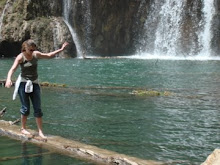Keith Sawyer's Creative Teaching: Collaborative Discussion as Disciplined Improvisation describes the dangers of scripted teaching in regards to student learning outcomes. Sawyer argues that effective teaching simply cannot stem from pure script, that a teacher must have skills akin to that of an improvisational actor in order to best reach the dynamic and unpredictable needs of the student. When I first read this article, I felt the need to double check the date in which it was published; do people still seriously believe scripted teaching is the most effective way to teach? Of course, with current NCLB policies slowly tearing down our nation's education system, I suppose I shouldn't have been surprised. But we all know that proponents of NCLB are clearly out of tune with what learning actually means. For those of us who aren't stuck with our heads up our own asses, improvisation learning, whether we've termed it that way or not, should not come as a surprise. Anyone who has ever stood in front of a classroom will vouch for the fact that a teacher simply cannot predict the questions a student will ask, or even the interpretations they will contrive from the information you try to give them. I suppose this technique can work if questions and discussion are not allowed. But then how much learning actually occurs?
Sawyer began to stray from the obvious when he moved into discussion of constructivist theory, and in turn sociocultural theory. He points out, with help from Rogoff, 1998, that "cognition is 'an aspect of human sociocultural activity' rather than 'a property of individuals" (14). In other words, we form knowledge together, with other inquiring individuals. This concept can be furthered explained in Kenneth Bruffee's article Collaborative Learning and the 'Conversation of Mankind' in which he points out that knowledge is constructed in a "community of knowledgeable peers" (90). In this type of community, we can come together to engage in and learn what Bruffee refers to as "normal discourse." In order for this so-called community of knowledgeable peers to obtain an agreed-upon piece of knowledge, they must engage in discussion, ask questions of each other and help each other understand their individual points of argument. Bruffee argues that this type of discussion is what leads to a mutual understanding of information, knowing the context of one's field.
What I feel is pertinent to know about these two discussions is simply that knowledge-gaining requires collaboration, regardless of the setting or profession. In the classroom, this can mean something as basic as group work, where students must collaborate with each other to solve a problem or analyze a text. When it comes to teaching, it then becomes important to be prepared for improvisation (if there is even a way to prepare necessarily) and to invite students to struggle within their community of peers to gain new understandings of the information considered "normal" for academics, and particularly the field of study. In a classroom such as this, I believe it is important to allow students to gain the ability to engage in "normal discourse" within their chosen fields. This is what the entire setting of academics should be for: learning the contexts and discussing ideas within them. Once out of the classroom setting, students eventually become "colleagues" within the field, as Bruffee describes, and then they will have the ability to engage in "abnormal discourse."
Here's where I think collaborative learning becomes essential: If students are never given the opportunity to engage in conversation and debate within a community of knowledgeable peers, they will never fully learn about the expansive amount of information that exists within their field. The scripted teaching that Sawyer talks about will not allow students to think critically about the subject, and thus will be left with a very skeletal overview--information they may or may not remember long term anyway. Bruffee argues that only when people within this knowledgeable community can no longer agree on what is true. "Abnormal discourse," or discussion that breaks from the normal conventions, can trigger fresh and often controversial thought. However, this is only achievable when one is well versed in his field; he knows the arguments, facts, figures and theories, yet he believes there is something more (or rather something the community has never discussed) to add to the conversation. Bruffee claims that "abnormal discourse sniffs out stale, unproductive knowledge and challenges its authority" (93). If this is the case, generations of students who were taught under the scripted model and never engage in collaborative discourse risk becoming generations of citizens who won't recognize when change needs to happen.
Sunday, March 8, 2009
Subscribe to:
Post Comments (Atom)

No comments:
Post a Comment